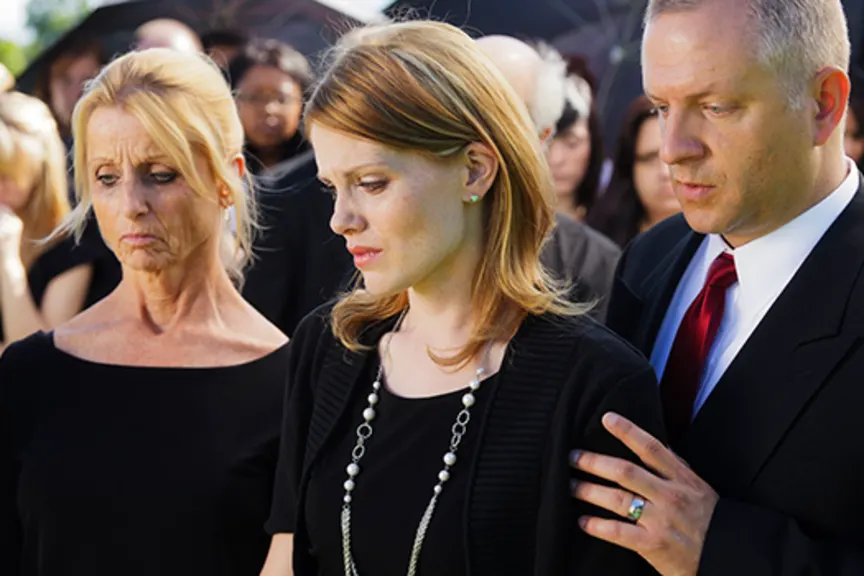The Emotional Impact of Losing a Loved One to Dementia

“Carol!” The hospicenurse’s voice was quiet but urgent. I instinctively knew what was happening. She had been shifting Dad’s position so that he wouldn’t develop bed sores, but as she was laying him back on the bed, something changed in his respiration. This was it. His body was preparing for him to take his last breath.
I slid back in my spot beside Dad and took him in my arms. His head drifted to my shoulder and that last, gentle breath slipped by unnoticed by me. What I felt was the positive force of Dad’s spirit leaving his body. And then — joy!
Did I just write joy? Yes, I did.
What I knew was this. Dad was finally released from the cage that had trapped his spirit over this last decade. The decade since his brain surgery left him with instant, severe dementia. Of course, that momentary joy was closely followed by a jumble of other emotions and, sadly, the grim realities following the physical death of my beloved father. But yes, for a moment, we were joined as one over the joy of his release.
My next thought was of Mom, in the bed next to Dad’s in the nursing home who simply couldn’t bear to watch. She had been unable to fully participate in Dad’s last hours due to her heavy pain medication, and she needed me with her. A curtain blocked Dad’s body from where I sat with Mom. I tried to physically shield her from the scene of the funeral home people arriving to put Dad’s body in a body bag, but I know she heard the final zzzzzip, as well as I— a sound that’s now part of my soul. I could only protect her from so much.
I needed to call my sister, who had left Dad’s side not a half hour before because he seemed to have rallied and she had a long drive to get home to her children. She’d planned to return in the morning. I needed to call my brother, who lived hundreds of miles away. I needed to tell my children. I also needed to reassure the nursing home people that I’d be back in the morning to remove Dad’s personal items from his side of the room.
There was no time to feel grief. Not yet. When I finally got to bed after a 24-hour day I was at first numb, soon followed by emptiness, then disbelief. Dad, who had been on the verge of death for a decade had, well, died. It had been a long journey, always knowing that he may not wake up one morning, but when his death happened it felt like a sudden death. My head knew that this was expected but I couldn’t absorb it. Not yet.
Gradually, of course, I did what we all do. I came to grips with the fact that my dad had died. I succumbed to heavy grief. I also felt what many feel but don’t want to admit — a sense of relief. Relief because Dad was no longer suffering. Relief because the never ceasing worry about his condition had been lifted from my shoulders.
Naturally, being a caregiver, I felt guilt, as well. I just knew that somehow, no matter how much I did do, I didn’t do enough. Or didn’t do it right. Or didn’t make the right choices. A decade of living inside of Dad’s head and being with him nearly every day and yet I’m thinking that I failed him?
Did anyone ever say emotions made sense?
But this was the man who held me when I was a child. The man who nearly burst with pride when I graduated from college. The man who loved me no matter what. Yet, at the end, my arms could nearly encircle his shrunken body, which had become simply a shell to shed as he moved on. Why wouldn’t I have confused emotions?
Surprise at death even after long illness
I’ve heard from many caregivers that even though they’ve known for a long time that their loved one was going to die, the event itself was a surprise. We’re never ready. If our loved one has suffered, we can feel good that they’ve moved on. Yet, we are selfish in many ways and can feel that they have abandoned us. Where is my dad who was always there for me? For some, the question is where is the spouse who was my soulmate? For most of us, no matter what the relationship, there’s a human feeling of abandonment.
I’ve since learned that Dad’s still there for me. He’s in my heart. He’s in my spirit. And, when I look in the mirror, he’s in my face. Yet those feelings of loss and abandonment are powerful. When my mother died five months later, the feeling of being orphaned was palpable. Of being the next generation up to bat. How did I get here? Can I handle it? Confusing emotions all.
Grief and relief: More compatible than you’d think
The most confusing of all the roiling emotions that we caregivers feel is the jumble of grief and relief. The grief that we are “supposed” to feel. The relief that we are ashamed to own. What kind of person feels relief when someone they love dies? Yet time, and communicating with other caregivers, will help us learn that good people have mixed feelings and no thoughts or feelings make us bad people.
Rebuilding life when caregiving ends
Many of us feel lost when the loved one who has been the focus of our attention dies. There is some relief that the struggle is over. That we can get some sleep and not be on edge, constantly waiting for that call about another emergency. But now we have to look deeply into our own lives and figure out “what now?” How do we restructure life after caregiving ends?
That will take time, my friend. First, you need to take care of yourself, physically, mentally, and emotionally. Then you can start filling the void with positive activities. Each individual will find unique ways of doing this. You’ll likely still have times when grief takes you by surprise and you nearly collapse. Yet those times will gradually become fewer and less powerful. Over time, you will reclaim your life, but you can only do so at your own pace.
If you feel yourself sinking too far down, get grief counseling. If your loved one was on hospice care, you will qualify for 13 months of free grief support. Otherwise, find someone in the private sector. The point is, get help if you need it. You don’t have to make sense out of your jumbled, conflicted emotions, but you have to work through them if you are to move forward. How you go about this will be an individual matter.





